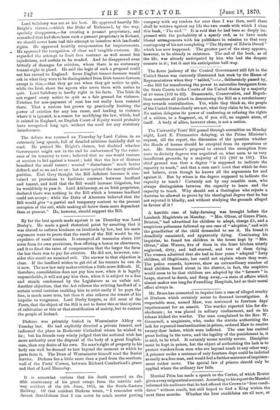Lord Salisbury was not at his best. He approved heartily
Mr. Bright's clauses,—which the Duke of Richmond, by the way, specially disapproves,—for creating a peasant proprietary, and remarked that had there been such a peasant proprietary in Ireland, we should never have had this attempt to interfere with landlords' rights. He approved heartily compensation for improvements. He approved the recognition of clear and tangible customs. Ile regarded the attempt to limit free contract as well meant but injudicious, and certain to be evaded. And he disapproved even bitterly of damages for eviction, where there is no customary tenant-right to plead. He said the logic of such a proposal could not but extend to England. Some English tenant-farmers would ask in what they were to be distinguished from Irish tenant-farmers except in this,—that they go out when they get notice to quit, while the Irish shoot the agents who aerie them with notice to quit. Lord Salisbury is hardly right in his facts. The Irish do not regard every notice to quit as a fair ground for violence. Eviction for non-payment of rent has not really been resisted there. That a custom has grown up practically limiting the power of eviction for any leas cause, and leading to violence where it is ignored, is a reason for modifying the law, which, had it existed in England, an English Court of Equity would probably have recognized long ago, without the need for any statutory interference.






























 Previous page
Previous page